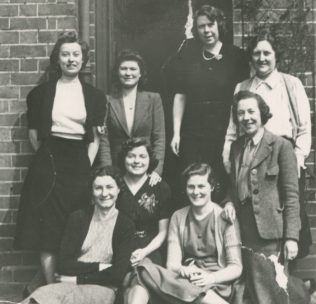Irene Nash


If you would like to listen to a short section of the interview as you read, please press the play button on the right. If you would like to read the whole interview transcript please follow the download link at the bottom.
EXCERPT:
At the beginning of the Second World War I was just an ordinary housewife, with a six-month old baby, a baby girl. My husband was a reservist, and he was called up before the war started, about two months before the war started, in September. So I was just an ordinary every day housewife, with a six month old baby.
Q- Had you ever worked?
Oh yea. I worked right up until I was expecting the baby. I’d always worked in the rag trade. They call it the rag trade now; we didn’t call it the rag trade then, but they now call it the rag trade. I worked in al department of the rag trade. That was in the West End. At the time when the war broke out I was living in Highgate In N19.
How I came to work for the post office was the fact that, owing to unfortunate circumstances, I’d lost my baby, and I had no children, because she was my only child, and it came that I had to do a job. I would have been sent away from home; I’d have either gone in the army or into munitions. Well, my husband was a serving soldier, and he definitely didn’t want me to go in the army, and I naturally didn’t want to leave home and go into munitions. I was living with my sister, and her husband was also reserved, so we decided to pool things and share a flat while both our husbands were abroad. They both went out with the British expeditionary force to France. So, how I came to work in the post office was the fact that that was war work. I went to labour exchange. You see, I lost my baby in 1940, January 1940, and I went and got myself a job doing army uniforms: that was more hand work, sewing on buttons and doing bits and pieces like that, but I found it very heavy. Then my husband came back from Dunkirk, and he was stationed for the time down in Lincolnshire on a big fruit farm which adjoined Reasby Abbey, and of course, he wanted me to go down there, which I did do, because he’d just come back from Dunkirk. So I stayed there for quite a while, with him, and then I cameback to London to work, to get a job. I went to the labour exchange, and they told me I’d have to do war work, so I put in for the post office.
It was my choice.
The nearest post office to me was called the North Western District post office, and it was quite a big one. They did every thing there; there were mail vans and a great big post office. You went to school in the post office, to learn where all the parts of London were. You had to know each district of London, you see, because not only were you a post woman, but you did a terrific amount of sorting as well for your different walks. If you picked up a pile of letters, you had to know where South East was, if it hadn’t got it on it, and you had, to know where more or less everywhere in the country was. I did sorting as well; I didn’t only do post office. Originally I was a post woman, but when I did night work I was sorting all the time. You had all pigeon holes, you see, and they were all marked, and when you picked a letter up, you had to know which pigeon hole in went in. So when you first went to the post office you went to school, in the post office.





No Comments
Add a comment about this page